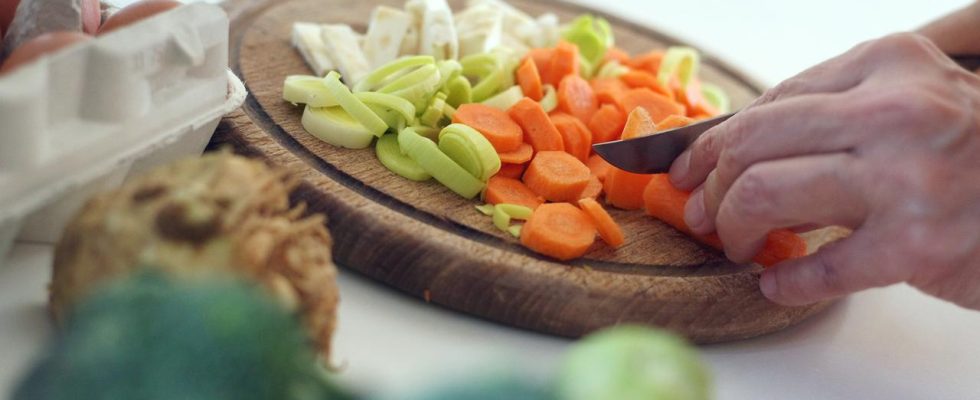background
Many foods have become expensive. But a balanced diet is possible even on a small budget. What tips experts give for shopping in the supermarket.
The inflation rate in Germany fell to 2.5 percent in February. However, prices continue to rise – including for food, an area in which there had previously been strong inflation. Especially for people with small budgets, eating healthy and at the same time cheaply is becoming more and more of a challenge.
According to the Stuttgart Consumer Center, preparation before shopping is crucial not only to save money but also to buy healthy food. You should first check what you have at home: leftovers should be used and products with an expired best-before date should be checked to see whether they are still edible.
Based on this, you can create a shopping list with pre-planned dishes. Andreas Winkler from Foodwatch also confirms how important a fresh and balanced diet is. He recommends paying attention to the Nutri-Score food label on processed foods, even if it is not found on all products.
Food pyramid as a guideline
The food pyramid of the German Nutrition Society can provide a guide when shopping. After that, fruits and vegetables are part of a complete diet as they provide lots of vitamins and fiber. A tip from the consumer advice center is to choose fruit and vegetables that are seasonal and regional, as these are often cheaper. This is also marked in some supermarkets.
But buying directly from the original producer or farmer is also an option. Consumer advocates also recommend going shopping in the evening, as some foods are on sale then.
Frozen fruits and vegetables as an alternative
An alternative is always frozen vegetables and fruit. Frozen foods are rich in nutrients due to the freezing process. It’s best to avoid sauces or other forms of processing – especially since the products are cheaper and healthier because they contain no sugar, salt or fat. However, the products should be heated well before consumption, according to the consumer advice center.
A debate is always organic versus conventional. Organic fruits and vegetables can be more expensive, but according to some studies they also contain more vitamins. But conventional products also offer good quality. However, there are now also good organic products from discounters such as Aldi or Netto.
whole grain products is also available in cheap
According to the food pyramid, whole grain products are essential for the diet. Not only do they provide important nutrients such as fiber, but they also fill you up longer than white flour products. Since whole grain products usually cost more, the consumer advice center recommends buying bread from the day before or using apps or looking for older bread in distribution refrigerators. When it comes to pasta, it is also advisable to mix normal pasta with the whole grain version. This way you can save money, but also get good nutrients.
The selection should be supplemented with animal foods. Milk and dairy products provide proteins, B vitamins and calcium and are usually inexpensive.
Expensive fish
In contrast, it is recommended to eat less meat and sausage. According to consumer advice centers, even a small amount of meat is enough for a healthy diet: 300 grams to 600 grams per week for adults. Since meat is usually more expensive, this can save money. Lentils or other legumes can also serve as a substitute for minced meat. They are cheaper as sources of energy and protein.
Fish is more difficult to replace – according to the consumer advice center, it is almost impossible. Oily fish such as salmon or mackerel are particularly important for the health of the cardiovascular system. However, good fish is expensive; especially when sustainability plays a role. The consumer advice center therefore recommends canned fish or dietary supplements. However, this also makes it difficult to cover the need for nutrients.
It doesn’t always have to be walnut oil
Walnut, linseed or olive oil would be ideal for nutrition. These are very good for the body due to the omega-3 fatty acids and the high proportion of monounsaturated fatty acids – but they are also very expensive. Linseed oil costs an average of 2.30 euros per 250 ml. Rapeseed oil could be an alternative, according to the consumer advice center. Refined rapeseed oil has a good fatty acid composition and is significantly cheaper at 3.30 euros per liter.
Proper preparation can not only save money, but also help with a healthy diet. However, it’s important to emphasize that these practices require a lot of planning and time, says Foodwatch expert Winkler. This approach is often difficult, particularly for people with multiple jobs or single parents. In addition, not everyone lives next to a first-time producer, which makes it tempting to turn to ready-made products as a time-saving alternative.

